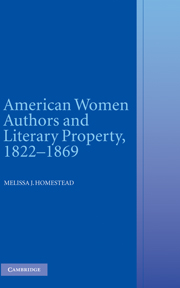Book contents
- Frontmatter
- Contents
- Preface: “Imperfect Title”
- Acknowledgments
- Introduction: “Lady-Writers” and “Copyright, Authors, and Authorship” in Nineteenth-Century America
- 1 Authors, Wives, Slaves: Coverture, Copyright, and Authorial Dispossession, 1831–1869
- 2 “Suited to the Market”: Catharine Sedgwick, Female Authorship, and the Literary Property Debates, 1822–1842
- 3 “When I Can Read My Title Clear”: Harriet Beecher Stowe and the Stowe v. Thomas Copyright Infringement Case (1853)
- 4 “Every body sees the theft”: Fanny Fern and Periodical Reprinting in the 1850s
- 5 A “Rank Rebel” Lady and Her Literary Property: Augusta Jane Evans and Copyright, the Civil War and After, 1861–1868
- Epilogue: Belford v. Scribner (1892) and the Ghost of Mary Virginia Terhune's Phemie's Temptation (1869); or, The Lessons of the “Lady-Writers” of the 1820s through the 1860s for Literary History and Twenty-First-Century Copyright Law
- Index
4 - “Every body sees the theft”: Fanny Fern and Periodical Reprinting in the 1850s
Published online by Cambridge University Press: 24 July 2009
- Frontmatter
- Contents
- Preface: “Imperfect Title”
- Acknowledgments
- Introduction: “Lady-Writers” and “Copyright, Authors, and Authorship” in Nineteenth-Century America
- 1 Authors, Wives, Slaves: Coverture, Copyright, and Authorial Dispossession, 1831–1869
- 2 “Suited to the Market”: Catharine Sedgwick, Female Authorship, and the Literary Property Debates, 1822–1842
- 3 “When I Can Read My Title Clear”: Harriet Beecher Stowe and the Stowe v. Thomas Copyright Infringement Case (1853)
- 4 “Every body sees the theft”: Fanny Fern and Periodical Reprinting in the 1850s
- 5 A “Rank Rebel” Lady and Her Literary Property: Augusta Jane Evans and Copyright, the Civil War and After, 1861–1868
- Epilogue: Belford v. Scribner (1892) and the Ghost of Mary Virginia Terhune's Phemie's Temptation (1869); or, The Lessons of the “Lady-Writers” of the 1820s through the 1860s for Literary History and Twenty-First-Century Copyright Law
- Index
Summary
At a pivotal moment in her autobiographical novel Ruth Hall (1854), Fanny Fern stages the eponymous heroine's triumph over a threat of unauthorized book publication of her popular newspaper sketches. Ruth has stopped writing for the weekly newspaper the Pilgrim because she is being paid more for her sketches by the Household Messenger and because she is anticipating income from the publication of a book collecting her earlier newspaper writing. The disgruntled editor of the Pilgrim, Mr. Tibbets, threatens to “immediately get out a cheap edition of your articles, and spoil the sale of your book.” Ruth, who initially allowed herself to be Tibbets's doormat when she was desperate to gain entrée into writing as a profession, uses this opportunity to assert her independence as an author. She tells Tibbets that she will not be “frightened, or threatened, or insulted”: “Even had I not myself the spirit to defy you … you could not accomplish your threat; for think you my publishers will tamely fold their arms, and see their rights infringed? No, sir, you have mistaken both them and me” (p. 157).
Ruth's self-assertion here paradoxically takes the form of an assertion of her publishers' rights to her book. They have invested capital in the enterprise of publishing her book, says Ruth the businesswoman, and the rights of capital will not be infringed. However, Ruth's claim is not entirely economic.
- Type
- Chapter
- Information
- American Women Authors and Literary Property, 1822–1869 , pp. 150 - 191Publisher: Cambridge University PressPrint publication year: 2005

